英语-苏州市2015-2016学年度第一学期高三期中调研试卷 英语
- 格式:doc
- 大小:1.35 MB
- 文档页数:16
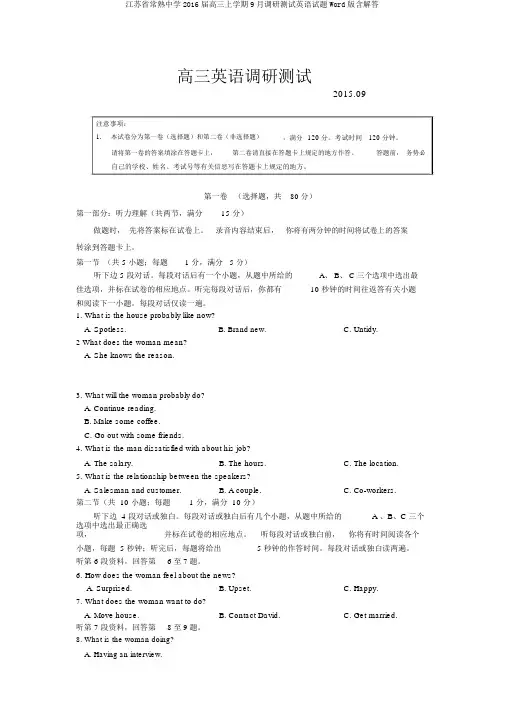
高三英语调研测试2015.09注意事项:1.本试卷分为第一卷(选择题)和第二卷(非选择题),满分120 分。
考试时间120 分钟。
请将第一卷的答案填涂在答题卡上,第二卷请直接在答题卡上规定的地方作答。
答题前,务势必自己的学校、姓名、考试号等有关信息写在答题卡上规定的地方。
第一卷(选择题,共80 分)第一部分:听力理解(共两节,满分15 分)做题时,先将答案标在试卷上。
录音内容结束后,你将有两分钟的时间将试卷上的答案转涂到答题卡上。
第一节(共 5 小题;每题 1 分,满分 5 分)听下边 5 段对话。
每段对话后有一个小题,从题中所给的佳选项,并标在试卷的相应地点。
听完每段对话后,你都有和阅读下一小题。
每段对话仅读一遍。
A、 B、 C 三个选项中选出最10 秒钟的时间往返答有关小题1. What is the house probably like now?A. Spotless.B. Brand new.C. Untidy.2 What does the woman mean?A. She knows the reason.3.What will the woman probably do?A.Continue reading.B.Make some coffee.C.Go out with some friends.4.What is the man dissatisfied with about his job?A. The salary.B. The hours.C. The location.5.What is the relationship between the speakers?A. Salesman and customer.B. A couple.C. Co-workers.第二节(共 10 小题;每题 1 分,满分 10 分)听下边 4 段对话或独白。
每段对话或独白后有几个小题,从题中所给的 A 、B、C 三个选项中选出最正确选项,并标在试卷的相应地点。
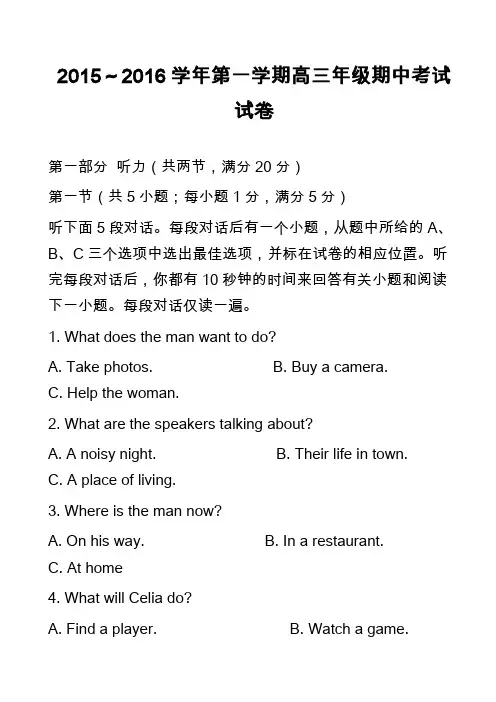
2015~2016学年第一学期高三年级期中考试试卷第一部分听力(共两节,满分20分)第一节(共5小题;每小题1分,满分5分)听下面5段对话。
每段对话后有一个小题,从题中所给的A、B、C三个选项中选出最佳选项,并标在试卷的相应位置。
听完每段对话后,你都有10秒钟的时间来回答有关小题和阅读下一小题。
每段对话仅读一遍。
1. What does the man want to do?A. Take photos.B. Buy a camera.C. Help the woman.2. What are the speakers talking about?A. A noisy night.B. Their life in town.C. A place of living.3. Where is the man now?A. On his way.B. In a restaurant.C. At home4. What will Celia do?A. Find a player.B. Watch a game.C. Play basketball.5. What day is it when the conversation takes place?A. Saturday.B. Sunday.C. Monday.第二节(共15小题;每小题1分,满分15分)听下面5段对话或独白。
每段对话或独白后有几个小题,从题中所给的A、B、C三个选项中选出最佳选项,并标在试卷的相应位置。
听每段对话或独白前,你将有时间阅读各个小题,每小题5秒钟;听完后,各小题给出5秒钟的作答时间。
每段对话或独白读两遍。
听第6段材料,回答第6、7题。
6. What is Sara going to do?A. Buy John a gift.B. Give John a surprise.C. Invite John to France.7. What does the man think of Sara’s plan?A. Funny.B. Exciting.C. Strange.听第7段材料,回答第8、9题。
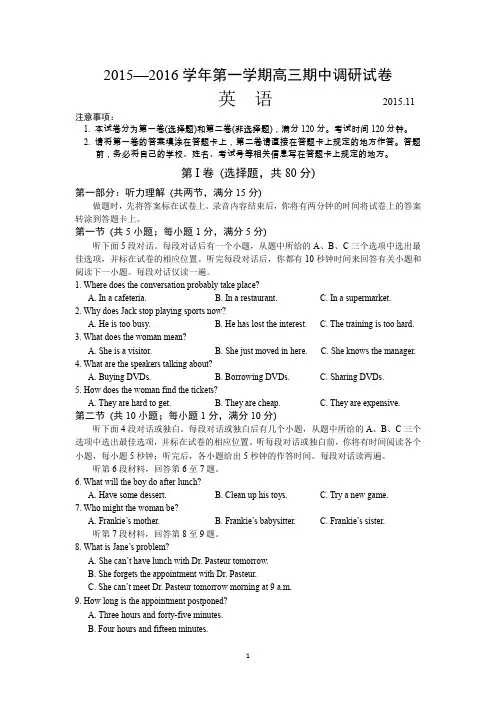
2015—2016学年第一学期高三期中调研试卷英语2015.11 注意事项:1. 本试卷分为第一卷(选择题)和第二卷(非选择题),满分120分。
考试时间120分钟。
2. 请将第一卷的答案填涂在答题卡上,第二卷请直接在答题卡上规定的地方作答。
答题前,务必将自己的学校、姓名、考试号等相关信息写在答题卡上规定的地方。
第I卷(选择题,共80分)第一部分:听力理解(共两节,满分15分)做题时,先将答案标在试卷上。
录音内容结束后,你将有两分钟的时间将试卷上的答案转涂到答题卡上。
第一节(共5小题;每小题1分,满分5分)听下面5段对话。
每段对话后有一个小题,从题中所给的A、B、C三个选项中选出最佳选项,并标在试卷的相应位置。
听完每段对话后,你都有10秒钟时间来回答有关小题和阅读下一小题。
每段对话仅读一遍。
1. Where does the conversation probably take place?A. In a cafeteria.B. In a restaurant.C. In a supermarket.2. Why does Jack stop playing sports now?A. He is too busy.B. He has lost the interest.C. The training is too hard.3. What does the woman mean?A. She is a visitor.B. She just moved in here.C. She knows the manager.4. What are the speakers talking about?A. Buying DVDs.B. Borrowing DVDs.C. Sharing DVDs.5. How does the woman find the tickets?A. They are hard to get.B. They are cheap.C. They are expensive.第二节(共10小题;每小题1分,满分10分)听下面4段对话或独白。
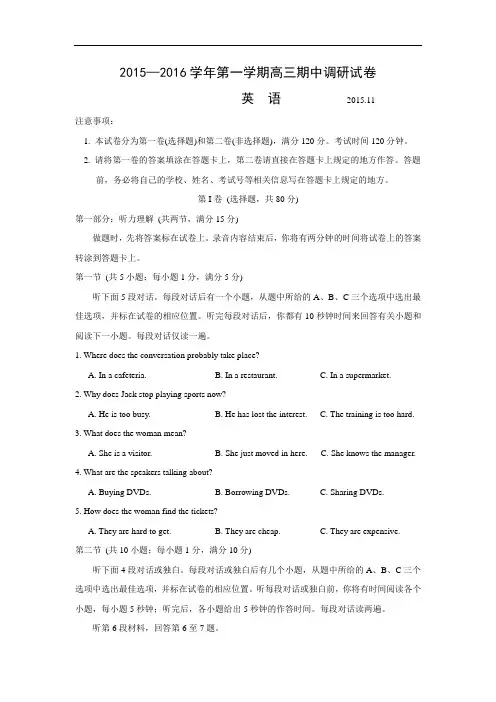
2015—2016学年第一学期高三期中调研试卷英语2015.11注意事项:1. 本试卷分为第一卷(选择题)和第二卷(非选择题),满分120分。
考试时间120分钟。
2. 请将第一卷的答案填涂在答题卡上,第二卷请直接在答题卡上规定的地方作答。
答题前,务必将自己的学校、姓名、考试号等相关信息写在答题卡上规定的地方。
第I卷(选择题,共80分)第一部分:听力理解(共两节,满分15分)做题时,先将答案标在试卷上。
录音内容结束后,你将有两分钟的时间将试卷上的答案转涂到答题卡上。
第一节(共5小题;每小题1分,满分5分)听下面5段对话。
每段对话后有一个小题,从题中所给的A、B、C三个选项中选出最佳选项,并标在试卷的相应位置。
听完每段对话后,你都有10秒钟时间来回答有关小题和阅读下一小题。
每段对话仅读一遍。
1. Where does the conversation probably take place?A. In a cafeteria.B. In a restaurant.C. In a supermarket.2. Why does Jack stop playing sports now?A. He is too busy.B. He has lost the interest.C. The training is too hard.3. What does the woman mean?A. She is a visitor.B. She just moved in here.C. She knows the manager.4. What are the speakers talking about?A. Buying DVDs.B. Borrowing DVDs.C. Sharing DVDs.5. How does the woman find the tickets?A. They are hard to get.B. They are cheap.C. They are expensive.第二节(共10小题;每小题1分,满分10分)听下面4段对话或独白。
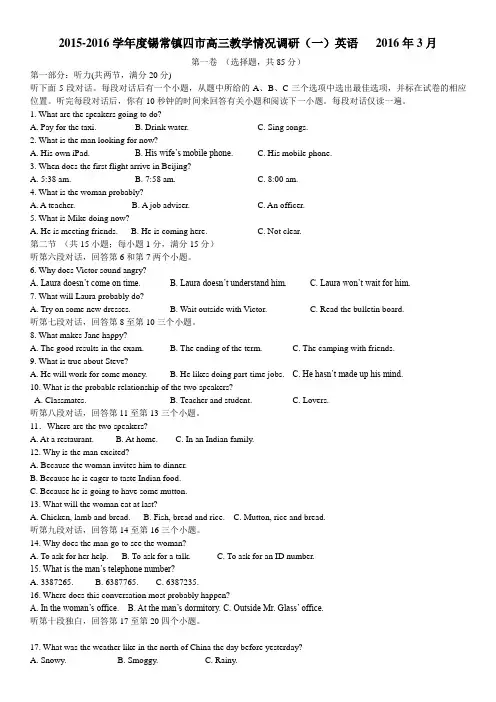
2015-2016学年度锡常镇四市高三教学情况调研(一)英语2016年3月第一卷(选择题,共85分)第一部分:听力(共两节,满分20分)听下面5段对话。
每段对话后有一个小题,从题中所给的A、B、C三个选项中选出最佳选项,并标在试卷的相应位置。
听完每段对话后,你有10秒钟的时间来回答有关小题和阅读下一小题。
每段对话仅读一遍。
1. What are the speakers going to do?A. Pay for the taxi.B. Drink water.C. Sing songs.2. What is the man looking for now?A. His own iPad.B. His wife’s mobile phone.C. His mobile phone.3. When does the first flight arrive in Beijing?A. 5:38 am.B. 7:58 am.C. 8:00 am.4. What is the woman probably?A. A teacher.B. A job adviser.C. An officer.5. What is Mike doing now?A. He is meeting friends.B. He is coming here.C. Not clear.第二节(共15小题;每小题1分,满分15分)听第六段对话,回答第6和第7两个小题。
6. Why does Victor sound angry?A. Laura doesn’t come on time.B. Laura doesn’t understand him.C. Laura won’t wait for him.7. What will Laura probably do?A. Try on some new dresses.B. Wait outside with Victor.C. Read the bulletin board.听第七段对话,回答第8至第10三个小题。
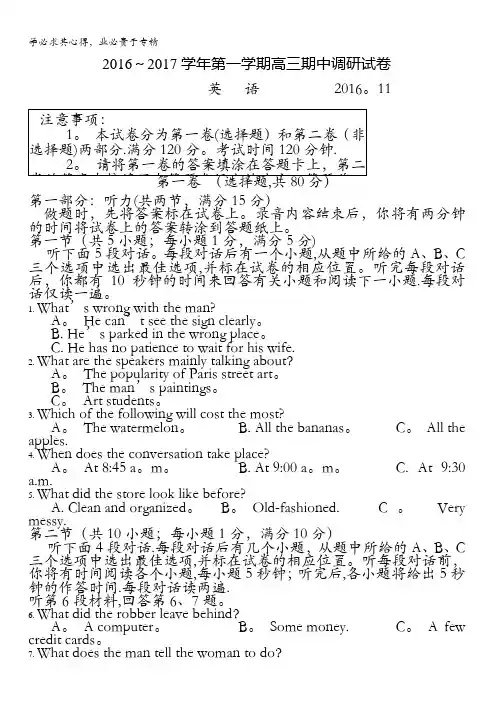
学必求其心得,业必贵于专精2016~2017学年第一学期高三期中调研试卷英语2016。
11第一部分:听力(共两节,满分15分)做题时,先将答案标在试卷上。
录音内容结束后,你将有两分钟的时间将试卷上的答案转涂到答题纸上。
第一节(共5小题;每小题1分,满分5分)听下面5段对话。
每段对话后有一个小题,从题中所给的A、B、C 三个选项中选出最佳选项,并标在试卷的相应位置。
听完每段对话后,你都有10秒钟的时间来回答有关小题和阅读下一小题.每段对话仅读一遍。
1.What’s wrong with the man?A。
He can’t see the sign clearly。
B. He’s parked in the wrong place。
C. He has no patience to wait for his wife.2.What are the speakers mainly talking about?A。
The popularity of Paris street art。
B。
The man’s paintings。
C。
Art students。
3.Which of the following will cost the most?A。
The watermelon。
B. All the bananas。
C。
All the apples.4.When does the conversation take place?A。
At 8:45 a。
m。
B. At 9:00 a。
m。
C. At 9:30a.m.5.What did the store look like before?A. Clean and organized。
B。
Old-fashioned. C。
Very messy.第二节(共10小题;每小题1分,满分10分)听下面4段对话.每段对话后有几个小题,从题中所给的A、B、C 三个选项中选出最佳选项,并标在试卷的相应位置。
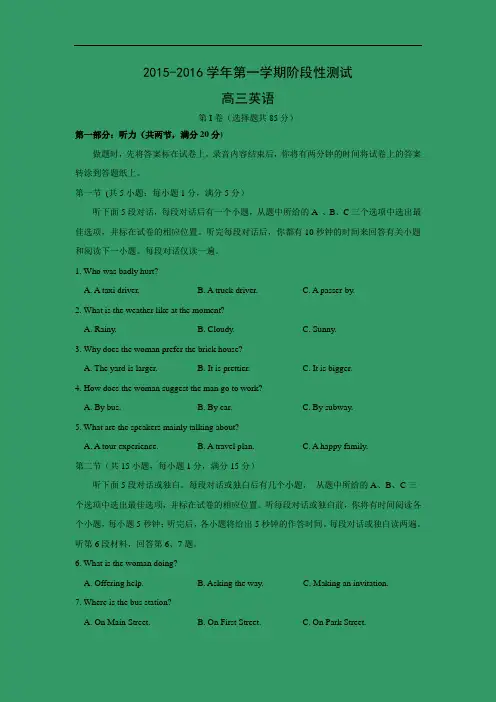
2015-2016学年第一学期阶段性测试高三英语第I卷(选择题共85分)第一部分:听力(共两节,满分20分)做题时,先将答案标在试卷上。
录音内容结束后,你将有两分钟的时间将试卷上的答案转涂到答题纸上。
第一节(共5小题;每小题1分,满分5分)听下面5段对话,每段对话后有一个小题,从题中所给的A 、B、C三个选项中选出最佳选项,并标在试卷的相应位置。
听完每段对话后,你都有10秒钟的时间来回答有关小题和阅读下一小题。
每段对话仅读一遍。
1. Who was badly hurt?A. A taxi driver.B. A truck driver.C. A passer-by.2. What is the weather like at the moment?A. Rainy.B. Cloudy.C. Sunny.3.Why does the woman prefer the brick house?A. The yard is larger.B. It is prettier.C. It is bigger.4. How does the woman suggest the man go to work?A. By bus.B. By car.C. By subway.5. What are the speakers mainly talking about?A. A tour experience.B. A travel plan.C. A happy family.第二节(共15小题,每小题1分,满分15分)听下面5段对话或独白。
每段对话或独白后有几个小题,从题中所给的A、B、C三个选项中选出最佳选项,并标在试卷的相应位置。
听每段对话或独白前,你将有时间阅读各个小题,每小题5秒钟;听完后,各小题将给出5秒钟的作答时间。
每段对话或独白读两遍。
听第6段材料,回答第6、7题。
6. What is the woman doing?A. Offering help.B. Asking the way.C. Making an invitation.7. Where is the bus station?A. On Main Street.B. On First Street.C. On Park Street.听第7段材料,回答第8至10题。
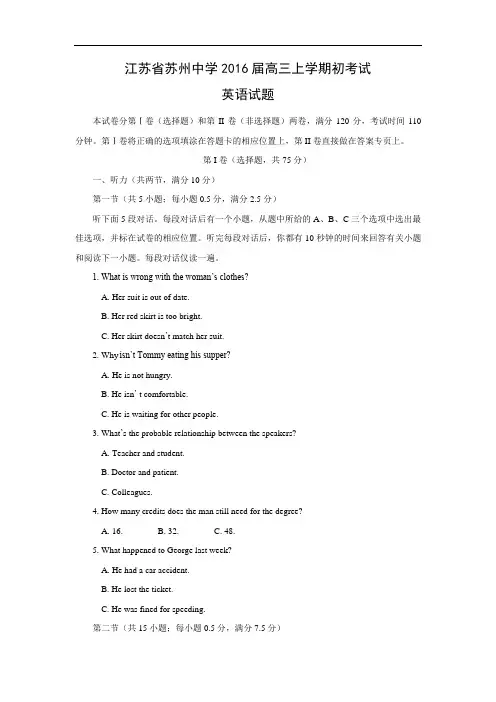
江苏省苏州中学2016届高三上学期初考试英语试题本试卷分第Ⅰ卷(选择题)和第II卷(非选择题)两卷,满分120分,考试时间110分钟。
第Ⅰ卷将正确的选项填涂在答题卡的相应位置上,第II卷直接做在答案专页上。
第I卷(选择题,共75分)一、听力(共两节,满分10分)第一节(共5小题;每小题0.5分,满分2.5分)听下面5段对话。
每段对话后有一个小题,从题中所给的A、B、C三个选项中选出最佳选项,并标在试卷的相应位置。
听完每段对话后,你都有10秒钟的时间来回答有关小题和阅读下一小题。
每段对话仅读一遍。
1. What is wrong with the woman’s clothes?A. Her suit is out of date.B. Her red skirt is too bright.C. Her skirt doesn’t match her suit.2. Why isn’t Tommy eating his supper?A. He is not hungry.B. He isn’ t comfortable.C. He is waiting for other people.3. What’s the probable relationship between the speakers?A. Teacher and student.B. Doctor and patient.C. Colleagues.4. How many credits does the man still need for the degree?A. 16.B. 32.C. 48.5. What happened to George last week?A. He had a car accident.B. He lost the ticket.C. He was fined for speeding.第二节(共15小题;每小题0.5分,满分7.5分)听下面5段对话或独白。
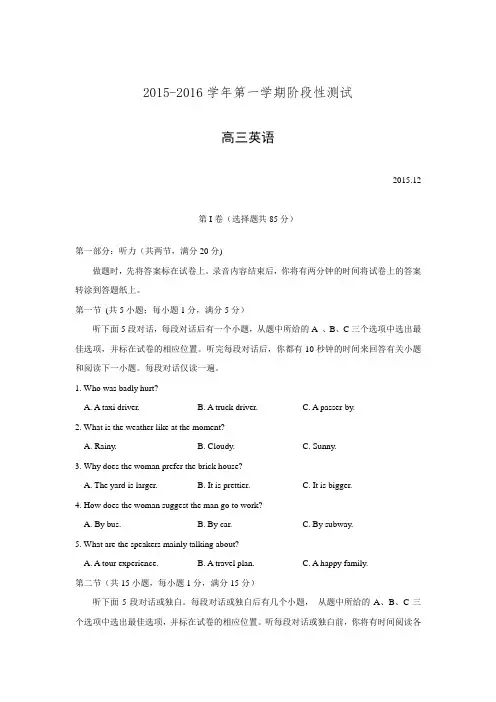
2015-2016学年第一学期阶段性测试高三英语2015.12第I卷(选择题共85分)第一部分:听力(共两节,满分20分)做题时,先将答案标在试卷上。
录音内容结束后,你将有两分钟的时间将试卷上的答案转涂到答题纸上。
第一节(共5小题;每小题1分,满分5分)听下面5段对话,每段对话后有一个小题,从题中所给的A 、B、C三个选项中选出最佳选项,并标在试卷的相应位置。
听完每段对话后,你都有10秒钟的时间来回答有关小题和阅读下一小题。
每段对话仅读一遍。
1. Who was badly hurt?A. A taxi driver.B. A truck driver.C. A passer-by.2. What is the weather like at the moment?A. Rainy.B. Cloudy.C. Sunny.3.Why does the woman prefer the brick house?A. The yard is larger.B. It is prettier.C. It is bigger.4. How does the woman suggest the man go to work?A. By bus.B. By car.C. By subway.5. What are the speakers mainly talking about?A. A tour experience.B. A travel plan.C. A happy family.第二节(共15小题,每小题1分,满分15分)听下面5段对话或独白。
每段对话或独白后有几个小题,从题中所给的A、B、C三个选项中选出最佳选项,并标在试卷的相应位置。
听每段对话或独白前,你将有时间阅读各个小题,每小题5秒钟;听完后,各小题将给出5秒钟的作答时间。
每段对话或独白读两遍。
听第6段材料,回答第6、7题。
6. What is the woman doing?A. Offering help.B. Asking the way.C. Making an invitation.7. Where is the bus station?A. On Main Street.B. On First Street.C. On Park Street.听第7段材料,回答第8至10题。
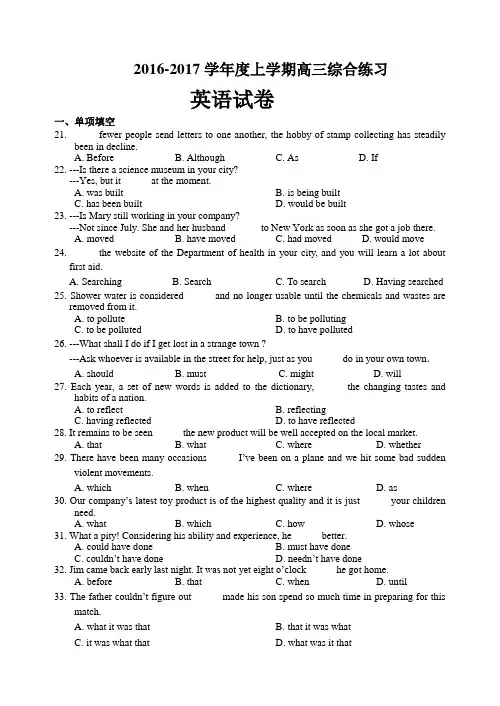
2016-2017学年度上学期高三综合练习英语试卷一、单项填空21. _____ fewer people send letters to one another, the hobby of stamp collecting has steadilybeen in decline.A. BeforeB. AlthoughC. AsD. If22. ---Is there a science museum in your city?---Yes, but it _____ at the moment.A. was builtB. is being builtC. has been builtD. would be built23. ---Is Mary still working in your company?---Not since July. She and her husband ______ to New York as soon as she got a job there.A. movedB. have movedC. had movedD. would move24. _____ the website of the Department of health in your city, and you will learn a lot aboutfirst aid.A. SearchingB. SearchC. To searchD. Having searched25. Shower water is considered _____ and no longer usable until the chemicals and wastes areremoved from it.A. to polluteB. to be pollutingC. to be pollutedD. to have polluted26. ---What shall I do if I get lost in a strange town ?---Ask whoever is available in the street for help, just as you _____ do in your own town.A. shouldB. mustC. mightD. will27. Each year, a set of new words is added to the dictionary, _____ the changing tastes andhabits of a nation.A. to reflectB. reflectingC. having reflectedD. to have reflected28. It remains to be seen _____ the new product will be well accepted on the local market.A. thatB. whatC. whereD. whether29. There have been many occasions _____ I’ve been on a plane and we hit some bad suddenviolent movements.A. whichB. whenC. whereD. as30. Our company’s latest toy product is of the highest quality and it is just _____ your childrenneed.A. whatB. whichC. howD. whose31. What a pity! Considering his ability and experience, he _____ better.A. could have doneB. must have doneC. couldn’t have doneD. needn’t have done32. Jim came back early last night. It was not yet eight o’clock _____ he got home.A. beforeB. thatC. whenD. until33. The father couldn’t figure out _____ made his son spend so much time in preparing for thismatch.A. what it was thatB. that it was whatC. it was what thatD. what was it that34. ---The old store enjoys a good reputation in this area.---I can’t agree more. There are very few, _____, complaints about their services.A. if anythingB. if anyC. if soD. if ever35. ---What do you think it is that matters much at home?---It is the atmosphere _____ you feel relaxed and comfortable.A. whereB. thatC. whichD. what二、完形填空Everyone hates to wait in lines. But it’s not always the length of the wait we find so ___36___. Our behavior when waiting is only ___37___ defined by the length of the wait. “Often the psychology of queuing is more ___38___than the statistics of th e wait itself,” said the MIT researcher Richard Larson, an expert on waiting lines.One obvious ___39___of queuing psychology is that we get bored when we wait in line. This issue is ___40___ in many ways, from magazines in hospital waiting rooms to mirrors in elevators ___41___we can check our appearance.We really ___42___ it when we expect a short wait and then get a long one. But studies show that we are much more ___43___when we are given an idea of how long we’ll be waiting. Walt Disney Co knows this ___44___ than anyone else. It posts estimated waiting times for attractions in its theme parks. But according to Larson, these times are ___45___ so that visitors get to the front of the queue more quickly than they expect. It keeps them ___46___.But perhaps the biggest influence on our feelings about waiting in a line has to do with our sense of ___47___. When it comes to queues, the universally acknowledged ___48___ is first come, first served. Any deviation (违反) from this principle is regarded as unfair and can___49___ violent queue rage (大怒).Sometimes however, we are willing to make ___50___. For example, we are fine with the priority given to those with a more critical condition in hospital. ___51___ in most situations, we demand fairness. You’ve probably ___52___ mild queue rage yourself in fast food restaurants, watching people in the other line move faster than you, ___ 53___ yourself for having chosen the “wrong” line.In order to solve this problem, the serpentine (蛇形的) line was ___54___. Slate magazine’s website explains: “The serpentine line isn’t always faster than multi-lines. But it offers important relief: you absolutely ___55___ have to see someone arrive after you and get served before you.”36. A. unchangeable B. uninteresting C. unbearable D. unbelievable37. A. simply B. partly C. naturally D. completely38. A. necessary B. different C. reasonable D. important39. A. reason B. aspect C. disadvantage D. result40. A. solved B. reflected C. explained D. discovered41. A. in case B. as if C. so that D. even if42. A. hate B. imagine C. understand D. consider43. A. careful B. patient C. worried D. polite44. A. less B. longer C. better D. worse45. A. incorrectly estimated B. accurately estimatedC. underestimatedD. overestimated46. A. happy B. relaxed C. busy D. surprised47. A. defeat B. fairness C. achievement D. disappointment48. A. truth B. information C. habit D. standard49. A. lead to B. result from C. relate to D. put forward50. A. differences B. changes C. exceptions D. preparations51. A. Then B. But C. So D. As52. A. experienced B. noticed C. prevented D. performed53. A. warning B. reminding C. excusing D. blaming54. A. changed B. replaced C. invented D. forbidden55. A. never B. often C. even D. still三、阅读理解ADid you ever wish that you had eyes in the back of your head? Some animals look like they do! However, these “eyes” aren’t for seeing---in fact, they can’t see at all and are called false eyes or eyespots.It’s easy to be fooled by eyespots---after all, they look a lot like eyes. Yet despite their strong resemblance to real eyes, eyespots are just designs, or patterns, found on different parts of an animal’s body. They’ve also been spied on fish, owls and all kinds of insects.You might wonder: if eyespots can’t help an animal see, why do they exist at all? Scientists believe one reason is that eyespots can create a strong reaction in other animals.In the world of the peacock, eyespots can make a male really stand out from the crowd. Peacocks have long, beautiful tails, often decorated with dozens of eyespots. The female peacock has only a short, unattractive brown tail, with no eyespots at all. During the mating season, males fan out their tails for display while females sit back and watch. Studies show that the male with the most eyespots will have the most opportunities to mate.Eyespots can also send an entirely different message, acting as a way for an animal to frighten its enemies away. The peacock butterfly has two sets of eyespots on its wings. At rest, the butterfly folds its wings above its body, displaying a dark underside. This helps the butterfly look less like tasty food to hungry birds. At times, a sharp-eyed enemy will see right through the disguise and dive down to catch it. The butterfly waits until the last possible moment before the bird closes in to open its wings. Out flash its eyespots, as large as the eyes of an owl. This scary display often frightens the bird into flying off.The four-eyed frog of South American uses a similar approach to defend itself. When an enemy approaches, the frog will turn around, bend over, and lift up its rear end to expose the big, black eyespots. Often, that’s enough to make its enemy run away.56. Which of the following is TRUE about peacocks?A. The female has fewer eyespots than the male.B. Males with the most eyespots are most popular.C. The male has a short and unattractive tail.D. Females open their tails to attract males.57. How many functions of animals’ eyespots are mentioned?A. 2.B. 3.C. 4.D. 5.BIt isn’t the first time I have picked tomatoes with Grandma. It is, however, the first time I realize why she requests my help.For as long as I can remember, Grandma’s plentiful tomato garden has been a sign of summer’s end. Each September, just as the decreased heat of the sun hints at cooler days, Grandma requests my help in her tomato garden. She pats my head and assures me she cannot pick tomatoes without my youthful eyes and quick mind. She says we need to examine each tomato and agree on its readiness for picking. While Grandma’s request for my help in the tomato garden is always the same, her desire for my help seems to increase each year.Grandma has eyes for finding even the tomatoes hidden by undergrowth and other tomatoes. I, however, just turn circles looking for the ones I think Grandma will like. I spot what looks like a ripe tomato, head in its direction, and then move to another that appears to be equally ripe. I usually end up watching Grandma and trying to stay out of her way, which seems the only way my eyes and mind are useful. While Grandma says we need to agree on which tomatoes are ready to be picked, my participation does not seem very important. Grandma knows which tomatoes are ready. It is as if she has been in the garden earlier that day, deciding which tomatoes will be picked. I often feel more of a hindrance(妨碍) than a help.It is not until today that I realize it is my company she cannot do without.There we are, lost in the tomato vines. As always, Grandma is walking from vine to vine, thanking me for my willingness to assist. I have to stand to spot the edge of Grandma’s hat amongst the plants. I try to stay near her so I can hear her comments and directions.Grandma’s eyes are always making good judgments, and they are no different in the vegetable garden. From afar she spots what looks like a ripe tomato. As she walks toward the garden, she evaluates the tomato a second time, but from a different angle. If it passes such inspection, I already know it will end up in the basket with the mound of others Grandma has carefully chosen. However, Grandma acts as if she needs a final look to be sure. She calls me to her side, kneels beside the vine while enjoying the warmth of the fading sunlight on her face, and holds the tomato in her hand. She turns each round, red ball toward the sunlight before disconnecting it from the vine with a half-hearted smile.She then looks at me. I nod my head and smile. Grandma assumes I smile in agreement with her tomato selection. I know I smile, instead, at her.58. We can infer from the passage that as a tomato picker, the author is ___.A. incompetentB. lazyC. enthusiasticD. skillful59. How does the author “already know” the tomato will “end up in the basket”?A. The author is an expert gardener.B. The author is Grandma’s assistant.C. The author has already inspected the tomato’s ripeness.D. The author has spent a lot of time gardening with Grandma.60. The last two sentences of the passage suggest that the author ___.A. realizes Grandma’s true intentionB. teases Grandma about her choice of tomatoesC. understands that Grandma wants reassuranceD. appreciates Grandma’s skill in finding ripe tomatoesCCredit card rewards programs have traditionally featured airline miles, gift certificates, and cash back for customers who spend enough on their cards to rack up points. But recently, credit card companies have started offering a different kind of gift: They’re handing out lower interest rates, refunding interest payments, and using other strategies to provide incentives for cardholders to pay down their debt and make on-time payments. The deals, however, don’t always work in consumers’ favor.The new Citi Forward card gives cardholders points and reduces their annual interest rate for making on-time payments and for staying under their credit limit. TD Bank’s Simply Flexible card changes customer’s interest rates depending on how much of their balance they pay off. If they pay off 10 percent or more of their balance, then they get the lowest available interest rate; paying between the minimum payment and 5 percent of the balance gets them the highest interest rate. And Discover’s Motiva card gives cardholders one month’s worth of interest back after six consecutive (连续的) on-time payments.Card companies say the idea behind the new rewards is to help customers get on top of their finances. “It’s all about promoting financial fitness and giving customers the choices they need to help them manage their debt,” says Michael Copley, senior vice president of retail lending for TD Bank. He says he thinks the Simply Flexible card motivates cardholders to pay off more of their debt and attributes the company’s relatively low delinquency(拖欠债款) rate to the product.Because of the continuing recession (经济萧条), companies have an incentive to keep their customers from sliding further under water. “This is in response to recognition on the part of issuers that they have to help their cardholders do a better job of managing their money so customers keep those cards for a long time,” says Ron Shevlin, senior analyst at Aite Group, a research and advisory firm. The challenge for companies, he says, is to balance the profitability of consumers who maintain a balance, and therefore pay interest fees each month, against the increased risk that those cardholders pose because they are more likely to default (拖欠) on their debt. Rewards programs that encourage customers to maintain a balance while paying on time, such as the Motiva card, may help them strike that balance.According to consumer advocates and credit card experts, consumers who carry a balance may be better off selecting a card with the lowest interest rate rather than participating in one ofthese rewards programs, although they can help consumers improve their credit. “In general, I think these cards are great for people who don’t have great credit and regularly carry a balance on their cards,” says Adam Jusko, founder of . “Customers who only occasionally carry a balance, on the other hand, would be better off finding a card with a more appealing rewards program,” he adds.61. The recent credit card rewards programs include ___.A. air milesB. gift certificatesC. cash backD. lower interest rates and interest payment refund62. A cardholder of simply Flexible Card will get the lowest interest rate if he ___.A. makes six successive on-time paymentsB. pays off the balance on time and stay under his credit limitC. pays off 15 percent of his balanceD. pays off 5 percent of his balance63. Michael Copley holds that rewards programs ___.A. don’t always work in customers’ favorB. can help the customers pay off more of their debtC. will help the cardholders manage their financeD. can result in a relative low delinquency rate to the credit card64. The underlined phrase “to keep from sliding further under water” implies that ___.A. the companies aim to help their customers during the recessionB. the companies are going to manage the money of their cardholdersC. the companies help the customers manage their finance better so they keep the cardslongerD. the companies want to give the customers more choices in the recession65. The consumer advocates and credit card experts suggest that ___.A. the lowest interest card is a better choice for those who carry a balanceB. the customers who pay off the balance should not participate in any rewards programC. it is better for those who pay off the balance to select a lower interest cardD. customers who carry a balance should select a card with some rewards programsDOver the last 25 years, British society has changed a great deal---or at least many parts of it have. In some ways, however, very little has changed, particularly where attitudes are concerned. Ideas about social class---whether a person is “working-class” or “middle-class”---are one area in which changes have been extremely slow.In the past, the working-class tended to be paid less than middle-class people, such as teachers and doctors. As a result of this and also of the fact that workers’ jobs were generally much less secure, distinct differences in life-styles and attitudes came into existence. The typical working man would collect his wages on Friday evening and then, it was widely believed, having given his wife her “housekeeping”, would go out and squander the rest on beer and betting.The stereotype of what a middle-class man did with his money was perhaps nearer the truth. He was---still is---inclined to take a longer-term view. Not only did he regard buying a house as a top priority, but he also considered the education of his children as extremely important. Both of these provided him and his family with security. Only in very few cases did workers have the opportunity (or the education and training) to make such long-term plans.Nowadays, a great deal has changed. In a large number of cases factory workers earn as much, if not more, than their middle-class supervisors. Social security and laws to improve job security, combined with a general rise in the standard of living since the mid-fifties of the 20th century, have made it less necessary than before to worry about “tomorrow”. Working-class people seem slowly to be losing the feeling of inferiority they had in the past. In fact there has been a growing tendency in the past few years for the middle-classes to feel slightly ashamed of their position.The changes in both life-styles and attitudes are probably most easily seen amongst younger people. They generally tend to share very similar tastes in music and clothes, they spend their money in having a good time, and save for holidays or longer-term plans when necessary. There seems to be much less difference than in previous generations. Nevertheless, we still have a wide gap between the well-paid (whatever type of job they may have) and the low-paid. As long as this gap exists, there will always be a possibility that new conflicts and jealousies will emerge, or rather than the old conflicts will reappear, but between different groups.66. Which of the following is seen as the cause of class differences in the past?A. Life-style and occupation.B. Attitude and income.C. Income and job security.D. Job security and hobbies.67. The writer seems to suggest that the description of ___ is closer to truth.A. middle-class ways of spending moneyB. working-class ways of spending the weekendC. working-class drinking habitsD. middle-class attitudes68. According to the passage, which of the following is NOT a typical feature of themiddle-class?A. Desiring for security.B. Making long-term plans.C. Having priorities in life.D. Saving money.69. Working-class people’s sense of security increased as a result of all the following factorsEXCEPT___.A. better social securityB. more job opportunitiesC. higher living standardD. better legal protection70. Which of the following statements is INCORRECT?A. Changes are slowly taking place in all sectors of the British society.B. The gap between working-class and middle-class young people is narrowing.C. Differences in income will remain but those in occupation will disappear.D. Middle-class people may sometimes feel inferior to working-class people.四、单词拼写1.Though the country is a_____ in natural resources, we should also save resources andpromote sustainable development.2.The country finally gained its independence today, and every citizen would remember thish_____ moment forever.3.The two reports c_____ each other, so one of them must be false.4.As is known to all, accidents happen when safety checks are o______.5.What are the c_____ for deciding which films should be included in the Film Festival?6.When the actor was awarded an Oscar, many people sent him their warmest _____ (祝贺)onhis success.7.The article was _____ (最初)published in our school’s newspaper.8.His mum has told him not to play with fire _____ (无数的) times.9.Wearing seat belts in cars are _____ (强制的) by law.10.He _____ (归因于) his success more to luck than to ability.五、句子转换1.The CN Tower, short for the Canadian National Tower, is one of the tallest towers in theworld.The Canadian National Tower, which is _____ the CN Tower _____ _____, _____ among the tallest towers in the world.2.Canada’s border with the USA is the longest border in the world not defended by an armyor the police.Canada’s border with the USA is the longest in the world. No armies or police are there _____ _____ of it.3.There is a real chance that a small percentage of students are able to pass the physicalexams.Students _____ a real _____ of passing the physical exams are _____ the _____.六、完成句子1.我们对展映的影片种类没有限制——只要一部影片的质量符合了我们的标准,不管是谁制作的,我们就会选中它。
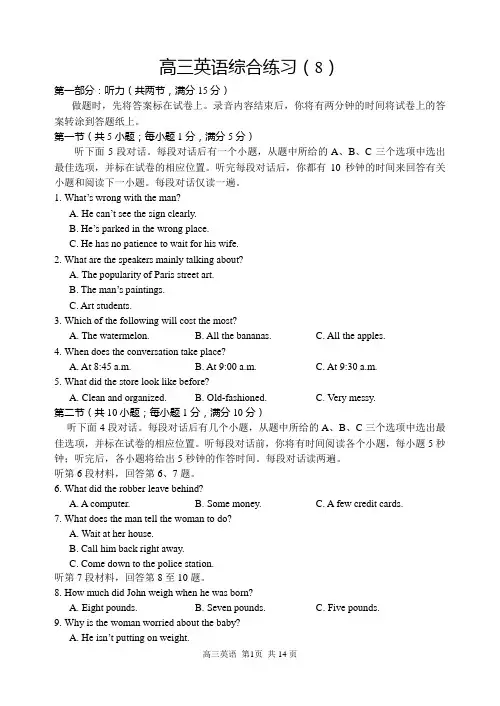
高三英语综合练习(8)第一部分:听力(共两节,满分15分)做题时,先将答案标在试卷上。
录音内容结束后,你将有两分钟的时间将试卷上的答案转涂到答题纸上。
第一节(共5小题;每小题1分,满分5分)听下面5段对话。
每段对话后有一个小题,从题中所给的A、B、C三个选项中选出最佳选项,并标在试卷的相应位置。
听完每段对话后,你都有10秒钟的时间来回答有关小题和阅读下一小题。
每段对话仅读一遍。
1.What’s wrong with the man?A. He can’t see the sign clearly.B. He’s parked in the wrong place.C. He has no patience to wait for his wife.2.What are the speakers mainly talking about?A. The popularity of Paris street art.B. The man’s paintings.C. Art students.3.Which of the following will cost the most?A. The watermelon.B. All the bananas.C. All the apples.4.When does the conversation take place?A. At 8:45 a.m.B. At 9:00 a.m.C. At 9:30 a.m.5.What did the store look like before?A. Clean and organized.B. Old-fashioned.C. Very messy.第二节(共10小题;每小题1分,满分10分)听下面4段对话。
每段对话后有几个小题,从题中所给的A、B、C三个选项中选出最佳选项,并标在试卷的相应位置。
听每段对话前,你将有时间阅读各个小题,每小题5秒钟;听完后,各小题将给出5秒钟的作答时间。
2016~2017学年第一学期高三期中调研试卷2016.11第一卷(选择题,共80分)第一部分:听力(共两节,满分15分)做题时,先将答案标在试卷上。
录音内容结束后,你将有两分钟的时间将试卷上的答案转涂到答题纸上。
第一节(共5小题;每小题1分,满分5分)听下面5段对话。
每段对话后有一个小题,从题中所给的A、B、C三个选项中选出最佳选项,并标在试卷的相应位置。
听完每段对话后,你都有10秒钟的时间来回答有关小题和阅读下一小题。
每段对话仅读一遍。
1.What’s wrong with the man?A. He can’t see the sign clearly.B. He’s parked in the wrong place.C. He has no patience to wait for his wife.2.What are the speakers mainly talking about?A. The popularity of Paris street art.B. The man’s paintings.C. Art students.3.Which of the following will cost the most?A. The watermelon.B. All the bananas.C. All the apples.4.When does the conversation take place?A. At 8:45 a.m.B. At 9:00 a.m.C. At 9:30 a.m.5.What did the store look like before?A. Clean and organized.B. Old-fashioned.C. Very messy.第二节(共10小题;每小题1分,满分10分)听下面4段对话。
每段对话后有几个小题,从题中所给的A、B、C三个选项中选出最佳选项,并标在试卷的相应位置。
高三英语一、单项选择(15%)21. The dispute between the neighboring states led to war, and to Parkistan_______control of Bangladesh.A. losingB. lostC. loseD. loss22. I‘m afraid I can‘t attend your party this evening, ______I‘d like to.A. much asB. as muchC. so muchD. so eagerly23. All the people who were present in the room when the diamond necklace wasstolen must ________ being searched.A. refer toB. take toC. refuse toD. submit to24. It will be a busy time for global leaders gathering in Beijing for the APECleadership summit that _______from November 5 to November 11.A. ranB. runsC. runningD. has run25. A child who always ______ at home may often find himself at odds(有矛盾)withothers.A. gets awayB. gets his wayC. gets in his wayD. gets on well26. _________ the Malaysia government cares about most is _______ action they aregoing to take to remove the influence of the disappearance of the Malaysia Airline Flight 370.A. That; thatB. What ; whichC. What; whatD. That; what27. Though the GDP growth in July-September marked the slowest quarterly growth,it was still _______ the reasonable range set by policy makers and in line with market expectation.A. againstB. withinC. beyondD. alongside28. Michael was _________the experiment a month ago, but he changed his mind atthe last minute.A. to startB. to be startingC. to have startedD. to have been starting29. But the Swiss discovered long years ago that constant warfare brought them_______suffering and poverty.A. anything butB. nothing butC. none other thanD. among other things30. Katherine is not _______ in the way to treat her children. Sometimes she is toostrict with them and sometimes she just allows them everything.A. conventionalB. consistentC. considerateD. controversial31. It is ________ his tremendous enthusiasm and devotion that the old teacher isrespected by all his students.A. with regard toB. in terms ofC. on account ofD. in reference to32. --I‘m surprised to discover that so many idioms come from the Bible. What aboutyou?--That‘s very interesting. I like the story about ―________‖, which is a good example to show the hidden weaknesses in the people we admire.A. feet of clayB. see the handwriting on the wallC. kill the fatted calfD. the apple of somebody‘s eye33.According to the newly-elected president, it is unwise to ______ imports tostimulate the growth of national economy.A. carry onB. catch onC. count onD. centre on34. According to Newton‘s first law of motion(运动) a body is in motion but actuallynever________ a body which will remain in motion forever because it is impossible to get rid of external influence.A. there will beB. it isC. is thereD. will it be35.The decision, announced October 21, represents only a slight change in flighttraffic from those countries most affected by the disease, -- Liberia, Sierra Leone and Guinea –, _______ most travelers from there already land at the five designated(指定的) airports, where strict Ebola screening procedures, such as passenger temperature readings to detect fevers, are now in place.A. becauseB. ifC. whileD. whether三、完形填空(20%)For many people today, reading is no longer relaxation. To keep up their work they must read letters, reports, trade publications, interoffice communications, not to mention newspapers and magazines: a never-ending flood of words. In ___36___ a job or advancing in one, the ability to read and comprehend ___37___ can mean the difference between success and failure. Yet the unfortunate fact is that most of us are ___38___ readers. Most of us develop poor reading ___39___ at an early age, and never get over them. The main deficiency(缺陷) ___40___ in the actual stuff of language itself----words. Taken individually, words have ___41___ meaning until they are strung together into phrased, sentences and paragraphs. ___42___ , however, the untrained reader does not read groups of words. He laboriously reads one word at a time, often regressing(倒退,退化) to ___43___ words or passages. Regression, the tendency to look back over ___44___ you have just read, is a common bad habit in reading. Another habit which ___45___ down the speed of reading is vocalization—sounding each word either orally or mentally as ___46___ reads.To overcome these bad habits, some reading clinics use a device called an ___47___ , which moves a bar (or curtain) down the page at a predetermined speed. The bar is set at a slightly faster rate ___48___ the reader finds comfortable, in order to ―stretch‖ him.The accelerator forces the reader to read fast, ___49___ word-by-word reading, regression and sub-vocalization, practically impossible. At first ___50___ is sacrificed for speed. But when you learn to read ideas and concepts, you will not only read faster, ___51___ your comprehension will improve. Many people have found ___52___ reading skill drastically improved after some training. ___53___ Charlce Au, a business manager, for instance, his reading rate was a reasonably good 172 words a minute ___54___ the training, now it is an excellent 1,378 words a minute. He is delighted that how he can ___55___ a lot more reading material in a short period of time.36. A. applying B. doing C. offering D. getting37. A. quickly B. easily C. roughly D. decidedly38. A. good B. curious C. poor D. urgent39. A. training B. habits C. situations D. custom40. A. lies B. combines C. touches D. involves41. A. some B. a lot C. little D. dull42. A. Fortunately B. Intentionally C. Logically D. Unfortunately43. A. reuse B. reread C. rewrite D. recite44. A. what B. which C. that D. if45. A. puts B. cuts C. slows D. measures46. A. some one B. one C. he D. reader47. A. accelerator B. actor C. amplifier(放大器) D. observer48. A. then B. as C. beyond D. than49. A. enabling B. leading C. making D. indicating50. A. meaning B. comprehension C. gist D. content51. A. but B. nor C. or D. for52. A. our B. your C. their D. his53. A. Look at B. Take C. Make D. Consider54. A. for B. in C. after D. before55. A. master B. go over C. present D. get through四、阅读理解 (30%)AWith Alibaba outsizing other IT giants such as Facebook, and Google in terms of its IPO valuation, Jack Ma might just have become one of the most popular English majors of all time. When his IPO roadshow video, delivered to shareholders in the US, went viral, for many, it was the first time they‘d heard Ma speak English. Ma learned English in an academic setting, but here he adapted his language skills to cross the threshold into the financial and business contexts. This speech released last week finds Ma‘s tone spot on as he tries to tell the tale of a Chinese business pursuing its dreams, big and small.―Hello, I'm Jack Ma, founder and chairman of Alibaba Group. Fifteen years ago, 18 founders in my apartment had a dream that someday we can build up a company that can serve millions of small business. Today, it remains our mission to make it easy to do business anywhere.At Alibaba, we fight for the little guy, the small businessmen and women and their customers. Our role is simple: through our ecosystem, we help merchants and customers find each other and conduct business on their terms and in ways that best serve their unique needs. We help merchants to grow, create jobs and open new markets in ways that were never before possible.Today, 15 years has passed. We‘ve grown so significantly and have become a household name in China. And soon, we‘ll be ready for the world to know us.You will hear details from our business later. But first let me take you on a journey around China, to see some of the real people, real stories that Alibaba has an impact on.[Personal stories of small businesses]I am proud to share with you these stories that show the heart and spirit of Alibaba. I‘m proud that we ignite(激发)innovation, create jobs benefit customers and help entrepreneurs fulfill their dreams.With Alibaba‘s platforms, people are improving their lives today, and have hope for a better tomorrow. From our humble beginnings and throughout the past 15 years, Alibaba has changed commerce in China. Our business has grown, but we never lost sight of our customers, focusing on solving their problems, leading to the best outcome for our business.Alibaba has come a long way, but we want to be a company that can last 102 years. We still have 87 years to go, and we believe one thing, ‗Today is difficult, tomorrow is more difficult, but the day after tomorrow is beautiful‘ . So we have to work very hard in order to survive the long journey.‖56. Which of the following has a WRONG interpretation of the underlined phrases?A. outsize: surpass, or do better thanB. go viral: become popular and spread like virusC. cross the threshold: enterD. the little guy: Ma Yun himself57. What can we get from the passage?A. Alibaba has defeated Facebook and Google in one respect.B. Ma Yun is the founder who adapted academic English for financial and businesscontexts.C. The 8 founders of the Alibaba team has fully realized the dream they had 15years ago.D. Alibaba Group has already been world-famous.58. During the past 15 years, many people have benefited a lot from Alibaba but NOT____________________________________.A. Johnson Rodriguez, who earns money from the share market in the US.B. Angela Wang, who owns a small private company.C. Wu Gang, a wine-merchant who just started his own business.D. Gong Xiaowei, who is an online shopaholic.59. Which of the following word can best describe Ma Yun‘s speech?A. Exaggerating(夸张的).B. Encouraging.C. Explicit.D. Enjoyable.BNo matter where the dads and their children go, that location immediately becomes a tourist destination. This has become a pattern for Hunan TV‘s reality show Where Are We Going, Dad?And last week the show was heading overseas for a special international episode. The entry has taken place in New Zealand, which was expected to become a popular travel destination for Chinese fans of the show.If you don‘t know much about New Zealand but would like to explore it, checkout our travel guide to see what kinds of activities might interest you.Nature and wildlife encounterNew Zealand was the last country on Earth to be settled by humans. As such, it‘s a paradise for exotic birds. You‘re also able to watch dolphins and whales on boat tours.Possible itinerary1. Auckland: fly in and visit Tiritiri Matangi conservation project (bellbirds spotting)2. Waipoua Forest: huge kauri trees3. Kaikoura: whale watching by boat or air seal watching, hike the Kaikoura Peninsula Walkway, join a dolphin encounter tour4. Wellington (Matiu/Somes Island): red-crowned parakeet, blue penguins, weta, skinks and tuatara5. Stewart Island: kiwi bird spotting6. Te Anau: takahe and kea7. Queenstown: fly to Auckland and then fly backLandscape loverLandscape lovers may have heard that New Zealand is brimming with natural wonders like active volcanoes, snowy mountaintops, glaciers perched near beaches and caves infested with glowworms. Indeed, you can‘t see many of these wond ers anywhere else in the world.Possible itinerary1. Auckland: fly in2. Whangamata: beach resorts and The Coromandel Forest Park (short walks, mountain bike trails)3. Waitomo: underground caves and glowworm caverns4. Rotorua: geothermal areas5. Abel Tasman: golden sand beaches (taking water taxi, sea kayaking, hiking, and snorkeling)6. Fox Glacier and Franz Josef: biggest glaciers in the country (hiking and guided glacier walks)7. Queenstown: crystal clear Lake Wakatipu (bungee jumping, sky diving, horse trekking and cycling)8. Milford Sound: fjord (boat cruises, sea kayaking, diving and flightseeing)9. Christchurch: fly back60. What is the purpose of this passage?A. To attract people to watch Hunan TV‘s reality show Where Are We Going, Dad?B. To prove the powerful influence the TV‘s reality show has on the chosen spot.C. To provide a general introduction to New Zealand.D. To serve as a tour guide for people who want to travel in New Zealand.61. Which of the following pairs doesn‘t have a cause-and-effect relationship?A. (a) Hunan TV‘s reality show shots at a certain location.(b) That location immediately becomes a tourist attraction.B. (a) Some readers are interested in New Zealand, yet they don‘t know a lot aboutit.(b) They find this passage very helpful.C. (a) New Zealand was the last land to be settled by humans.(b) It‘s a paradise for exotic birds.D. (a) New Zealand is abundant with natural wonders.(b) Caves there are crowded with glowworms.COne of the biggest va riables when flying is the company that you‘re forced to keep. Whether you're in economy or business, aisle or window, there will almost always be someone sitting next to you –and if that person is particularly odoriferous(有气味的), anxious or loud, your experience could suddenly be changed.But with recent upgrades(飞机座位提级) allowing noise-conscious passengers to choose a seat away from children, having at least one type of less-than-desirable seatmate could soon be a thing of the past.Last week, Scoot airlines, the budget branch of Singapore Airlines, announced that seats in child-free areas, nick-named t he ―ScootinSilence‖ rows, can now be booked for a small fee. In addition to extra leg room and a better seat pitch, you are also liberated from having to sit with children 12 and under.―Just as there are som e people who prefer to travel without checked baggage, or to sleep rather than eat… there are some who would rather travel with adults. We‘re simply providing the option to do so,‖ said Scoot Airlines CEO Campbell Wilson.In September 2012, AirAsia X launched a similar service in their premium economy cabin, and Malaysian Airlines has a similar policy on the upper-deck economy cabin of its A380 jumbo jet, which it flies on select long-haul routes.The trend seems to be catching on quickly in Asia, perhaps because culturally the region consider the wealthier business savvy class more important and is eager to please rich customers.But could child-free zones spread around the world? Not necessarily.―I don't think that we'll ever see child-free zones on US carriers, any more than we'll see the return of smoking zones. In the politically correct United States, it would be considered discriminatory to exclude passengers with kids from certain cabin se ctions,‖ said George Hobica, founder of . ―But in Asia, where it's legal to 'retire' flight attendants when they reach the ripe old age of 35, a different sensibility applies.‖The issue that Western airlines will need to consider is the strong consumer voice, which could create a significant and harmful image problem for the carriers. In Asia, that community is not as loud ,and they don‘t protest much. Disturbing the consumer base and any potential discrimination litigation(诉讼) that would follow may create risks that Western carrier s aren‘t willing to take.62. What does the first paragraph mean?A. The class of seats you are sitting in determines the quality of the trip.B. The class of seats do not matter because the experience is the same.C. The people you are sitting with determines the quality of the trip.D. The people you are sitting with do not matter because the experience is the same.63. What prevents child-free zones spread around the world?A. That there are smoking zones.B. The political control over seatings on planes in countries like the USC. That people from other countries are not as age-sensible as AsiansD. The value of fairness in other countries64. What is the opinion of the author?A. He likes the idea of child-free zones.B. He does not like the idea of child-free zones.C. We are not told.D. He does not like travelling in business classes.65. What is the argument from Scoot Airlines CEO?A. He thinks people are travelling without children more and more.B. He thinks carriers should charge an extra fee for each extra service.C. He thinks carriers should offer more options to cater to different customers.D. He thinks people are paying less for flights because people do not want to payfor food and luggage.DPeople are being lured (引诱)onto Facebook with the promise of a fun, free service without realizing they‘re paying for it by giving up loads of personal information. Facebook then attempts to make money by selling their data to advertisers that want to send targeted messages.Most Facebook users don‘t realize this is happening. Even if they know what the company is up to, they still have no idea what they‘re paying for Face book because people do n‘t really know what their personal data is worth.The biggest problem, however, is that the company keeps changing the rules. Early on, you could keep everything private. That was the great thing about facebook --you could create your own little private network. Last year, the company changed its privacy rules so that many things-- your city, y our photo, your friends‘ names-were set, by default (默认)to be shared with everyone on the Internet.According to Facebook‘s vice-president Elliot Schrage, the company is simply making changes to improve its service, and if people don‘t share information, they have a ―less satisfying experience‖.Some critics think this is more about Facebook looking to make more money. Its original business model, which involved selling ads and putting them at the side of the pages, totally failed. Who wants to l ook at ads when they‘re online connecting with their friends?The privacy issue has already landed Facebook in hot water in Washington. InApril, Senator Charles Schumer called on Facebook to change its privacy policy. He also urged the Federal Trade Commission to set guidelines for social-networking sites.―I think the senator rightly communicated that we had not been clear about what the new products were and how pe ople could choose to use them or not to use them,‖ Schrage admits.I suspect that whatever Facebook has done so far to invade our privacy, it‘s only the beginning, w hich is why I‘m considering deactivating(撤销)my account. Facebook is a handy site, but I‘m upset by the idea that my information is in the hands of people I don‘t trust. That‘s too high a price to pay.66.What do we learn about Facebook from the first paragraph?A. It is a website that sends messages to targeted users.B. It makes money by putting on advertisements.C. It profits by selling its users‘ personal data.D. It provides loads of information to its users.67.What does the author say about most Facebook users?A. They are unwilling to give up their personal information.B. T h ey don‘t know their personal data enriches Facebook.C. They don‘t identify themselves when using the website.D. They care very little about their personal information.68.Why does Facebook make changes to its rules according to Elliot Schrage?A. To provide better service for its users.B. To obey the Federal guidelines.C. To improve its users‘ connectivity.D. To expand its range of business.69.What does Senator Charles Schumer advocate?A. Setting guidelines for advertising on websites.B. Banning the sharing of users‘ personal information.C. Making regulations for social-networking sites.D. Removing ads from all social-networking sites.70.Why does the author plan to cancel his Facebook account?A. He is dissatisfied with its current service.B. He finds many of its users untrustworthy.C. He doesn‘t want his personal data abused.D. He is upset by its frequent rule changes.第II卷(非选择题,共45分)五、任务型阅读(10%)阅读短文,根据所读内容在文章后图表中的空格里填入最恰当的单词(每空1词) Interviewing someone for a job is not as easy as it looks. First, as the interviewer, you‘re tasked with finding the person who will not only do the job well but also fit in well with the other employees.You have to make an evaluation of abs tract qualities that can‘t be found on a résumé. Because you have to repeat the process for every potential employee, you end up asking question after question, applicant after applicant.Still, interviewers need to be told something: ―What is your biggest weakness?‖ is not a good question. It just isn‘t.Now, job seekers have to understand that interviewers want to find some way to know what makes an applicant different from others. Asking questions that are seemingly impossible to answer is one way to see who can think creatively. Then what may be a proper way to respond to such a question?Honesty, with a twist(新手法)―‗What are your three strengths and three weaknesses?‘ is a classic, but not too many people know how to answer this,‖ says Kenneth C. Wisne fski, founder and CEO of WebiMax, an online marketing company.―As an interviewer, we want to hear strengths that describe initiative(主动性), motivation and dedication. The best way to respond is to include these qualities into specific ‗personal statements.‘‖―Similarly, weaknesses should be positioned as a strength that can benefit the employer.‖―I like to hear applicants state an exaggerated strength, and put an interesting twist on it. An example of this is, ‗My initiative is so strong, that sometimes I take on too many projects at a time.‘‖This answer leads with a strength that employers want —initiative —and still acknowledges that you‘re not perfect.Although you might consider this acknowledgement too honest, it works because it proves you‘re being honest.Honesty, with progressWhen you consider what your weaknesses are, think about how you have attempted to overcome them. No one is perfect, so pretending that you are a perfectionist will come across as insincere.Debra Davenport, author of ―Career Shuffle,‖ believes citing(引用) examples are the best approach.―My preferred response for this question is to tell the truth without damaging the applicant‘s image.‖ Davenport explains.―A better response might be, ‗I‘ve had some challenges with work-life balance in the past and I realize that a life out of balance isn‘t good for me, my family or my employer. I‘ve taken the time to learn better time and project management, and I‘m also committed to my overall wellness.‖The answer adds some dimension to the question, and proves you‘ve thought beyond the answer. You‘ve actually changed your behavior to address the situation, even if you haven‘t completely overcome the weakness.Put yourself in the interviewer’s shoesHowever you decide to answer, Debra Ye rgen, author of ―Creating Job Security Resource Guide,‖ recommends job seekers imagine themselves sitting on the other side of the desk.六、单词拼写: (10%)81. ______(负担) with a big family, the man had to work three jobs.82. A disastrous earthquake s______ Tangshan on July 28th, 1976, causing nearly 240,000 deaths.83. Though he doesn‘t call on his elderly grandparents every day, he does pay a visit tothem on a regular b______ to check if they are doing fine.84. Feeling embarrassed and shy, Maggie ______ (捂, 埋) her face in her hands.85. All areas of history are affected by the geographical environment and no respectable historian could pursue the study of history without a t_______ knowledge of geography.86. Even though you have successfully booked the trip, still you will have to write to ______ (确认) your reservation.87. Due to disabilities in both hands that resulted from a fire accident, the man had to give up his o______ as a taxi driver.88. His claim was so far from being true that it ______(投下,使怀疑) doubt on his honesty and sincerity.89. The message of the speech he d______ yesterday was clear enough to get across to all the audience.90. Stella had only a ______(模糊的) idea of the amount of water consumed every month, not knowing exactly how many tons it was.七、书面表达(25%)(共1小题,满分25分)阅读下面短文,然后按要求写一篇150词左右的英语短文。
2015-2016学年高三上学期英语期中考试参考答案听力:1-5CABCB 6-10CBBBA 11-15ACCBA 16-20CABAA 阅读:21-23 DCB 24-27 ACBA 28-31DACD 32-35 BCDA 36-40 FECDA完型:41-45 BDACA 46-50 CBADB 51-55 CDABC 56-60 DCBBA语法:61.tired 62.it. 63.are being encouraged. 64.experience. 65.as. 66.and.ter. 68.peaceful. 69.up. 70.making改错:Dear Miss Li,I am very happy to have you as our English teacher.As the world is becoming global village, English is getting more and more∧aimportant, so master English means we can see the world through a new window.masteringMy English is just OK and the two mainly problems in my study is that I feelmain areit difficult to learn words by heart, and that I often feel nervous when speakspeaking English. I really hope that you can give me a good advice on what to memorize newhowwords. Another suggestion is to give them more chances to practice speaking. Iusbelieved we can make much progress in English under your help.believe withThank you!写作参考范文:Dear Monitor of each class,I’m Li Hua, Chairman of the Student Union. I’m writing to announce something important. The Student Union has decided to host an English Speech Contest soon and the arrangement is as follows.First, the contest will be held from 4 p.m. to 6 p.m., on Friday, June 1st on the3rd floor in the school library. Second, the procedure includes two parts. Participants will give a two-minute self-introduction first. And then they will geta topic at random to talk about their opinions, which should be finished within three minutes. By the way, we have invited Mr. Smith the foreign teacher, Professor Zhang from Beijing University and three English teachers of our schoolto be the judges. Last but not least, each class must pick out two students to take part in the contest.All the students are welcome to attend the contest.Sincerely yoursLi Hua蒋晓芸:语篇填空符雪娟:改错陈江梅:作文。
江苏省苏州中学2015-2016学年度第一学期52阶采点高三英语本试卷分第Ⅰ卷(选择题)和第II卷(非选择题)两卷,满分120分,考试时间120分钟。
所有答案都做在答题纸上。
第I卷(选择题,共75分)一、听力部分(共两节,满分10分)第一节(共5小题;每小题0.5分,满分2.5分)听下面5段对话。
每段对话后有一个小题,从题中所给的A、B、C三个选项中选出最佳选项,并标在试卷的相应位置。
听完每段对话后,你都有10秒钟的时间来回答有关小题和阅读下一小题。
每段对话仅读一遍。
1. What is the relationship between the two speakers?A. Employer and employee.B. Waitress and customer.C. Mother and son.2. Where was the man born?A. In Sydney.B. In Ireland.C. In Scotland.3. What are the two speakers doing?A. Watching television.B. Listening to the teacher.C. Making the program.4. Which tablecloth is cheaper?A. The green one.B. The red one.C. The blue one.5. What does the man mean?A. He will go to the library.B. He will borrow these books.C. He will go to school this morning.第二节(共15小题;每小题0.5分,满分7.5分)听下面5段对话或独白。
每段对话或独白后有几个小题,从题中所给的A、B、C三个项中选出最佳选项,并标在试卷的相应位置。
2015~2016学年第一学期高三英语期中试题I.听力(15%)第一节(共5小题,满分2.5分)1.What is Jack doing now?A.Having lunch.B.Typing his report.C.Having a meeting.2.What does the woman mean?A.Linda diesn’t know them well.B.She will phone Linda at once.C.Linda is her good friend.3.What are the speakers talking about?A.The woman’s new house.B.The woman’s knew school.C.The woman’s new friend.4.What does the man want to buy?A.A· sofaB.A chair B.A table5.How much should the woman pay in all?A.50 dollarsB.100 dollarsC.150 dollars第二节(共15小题,满分12.5分)听第6段材料回答6,7题。
6.Where does the conversation take place?A.In a store.B.In a factory.C.In a museum.7.How much should the woman pay?A.$2199B.$2999C.3199听第7段材料,回答第8,9题。
8.What does the man think of his new job?A.BoringB.EasyC.Interesting9.What is the man’s boss like?A. Kind the friendly.B.Serious but considerate.C.Serious but helpful.听第8段材料,回答第10至12题。
高三英语综合练习(8)第一部分:听力(共两节,满分15分)做题时,先将答案标在试卷上。
录音内容结束后,你将有两分钟的时间将试卷上的答案转涂到答题纸上。
第一节(共5小题;每小题1分,满分5分)听下面5段对话。
每段对话后有一个小题,从题中所给的A、B、C三个选项中选出最佳选项,并标在试卷的相应位置。
听完每段对话后,你都有10秒钟的时间来回答有关小题和阅读下一小题。
每段对话仅读一遍。
1.What’s wrong with the man?A. He can’t see the sign clearly.B. He’s parked in the wrong place.C. He has no patience to wait for his wife.2.What are the speakers mainly talking about?A. The popularity of Paris street art.B. The man’s paintings.C. Art students.3.Which of the following will cost the most?A. The watermelon.B. All the bananas.C. All the apples.4.When does the conversation take place?A. At 8:45 a.m.B. At 9:00 a.m.C. At 9:30 a.m.5.What did the store look like before?A. Clean and organized.B. Old-fashioned.C. Very messy.第二节(共10小题;每小题1分,满分10分)听下面4段对话。
每段对话后有几个小题,从题中所给的A、B、C三个选项中选出最佳选项,并标在试卷的相应位置。
听每段对话前,你将有时间阅读各个小题,每小题5秒钟;听完后,各小题将给出5秒钟的作答时间。
2015—2016学年第一学期高三期中调研试卷英语2015.11 注意事项:1. 本试卷分为第一卷(选择题)和第二卷(非选择题),满分120分。
考试时间120分钟。
2. 请将第一卷的答案填涂在答题卡上,第二卷请直接在答题卡上规定的地方作答。
答题前,务必将自己的学校、姓名、考试号等相关信息写在答题卡上规定的地方。
第I卷(选择题,共80分)第一部分:听力理解(共两节,满分15分)做题时,先将答案标在试卷上。
录音内容结束后,你将有两分钟的时间将试卷上的答案转涂到答题卡上。
第一节(共5小题;每小题1分,满分5分)听下面5段对话。
每段对话后有一个小题,从题中所给的A、B、C三个选项中选出最佳选项,并标在试卷的相应位置。
听完每段对话后,你都有10秒钟时间来回答有关小题和阅读下一小题。
每段对话仅读一遍。
1. Where does the conversation probably take place?A. In a cafeteria.B. In a restaurant.C. In a supermarket.2. Why does Jack stop playing sports now?A. He is too busy.B. He has lost the interest.C. The training is too hard.3. What does the woman mean?A. She is a visitor.B. She just moved in here.C. She knows the manager.4. What are the speakers talking about?A. Buying DVDs.B. Borrowing DVDs.C. Sharing DVDs.5. How does the woman find the tickets?A. They are hard to get.B. They are cheap.C. They are expensive.第二节(共10小题;每小题1分,满分10分)听下面4段对话或独白。
每段对话或独白后有几个小题,从题中所给的A、B、C三个选项中选出最佳选项,并标在试卷的相应位置。
听每段对话或独白前,你将有时间阅读各个小题,每小题5秒钟;听完后,各小题给出5秒钟的作答时间。
每段对话读两遍。
听第6段材料,回答第6至7题。
6. What will the boy do after lunch?A. Have some dessert.B. Clean up his toys.C. Try a new game.7. Who might the woman be?A. Frankie’s mother.B. Frankie’s babysitter.C. Frankie’s sister.听第7段材料,回答第8至9题。
8. What is Jane’s problem?A. She can’t have lunch with Dr. Pasteur tomorrow.B. She forgets the appointment with Dr. Pasteur.C. She can’t meet Dr. Pasteur tomorrow morning at 9 a.m.9. How long is the appointment postponed?A. Three hours and forty-five minutes.B. Four hours and fifteen minutes.C. Six hours.听第8段材料,回答第10至12题。
10. What did Mr. Tang major in in the university?A. Chinese.B. Journalism.C. International operation.11. What was Mr. Tang responsible for when he worked in a media company?A. Gathering the international news.B. Writing the current reports.C. Expanding the operation.12. Why would Mr. Tang like to work in China?A. He can have a good chance to meet his parents.B. He can make good use of his operation ability.C. He can make good use of his Chinese and English.听第9段材料,回答第13至15题。
13. What can the iMaid do?A. Wash dishes.B. Dry the clothes.C. Clean up dirt from floors.14. How long can the iMaid work after being charged?A. Three hours.B. Ten hours.C. Thirteen hours.15. According to the talk, what is the best thing about the iMaid?A. The special gift worth $49.B. The price.C. The service contract.第二部分:英语知识运用(共两节,满分35分)第一节单项选择(共15小题;每小题1分,满分15分)请认真阅读下面各题,从题中所给的A、B、C 、D 四个选项中,选出最佳选项,并在答题卡上将该项涂黑。
16. — Tu Youyou and the other two scientists jointly won the 2015 Nobel Prize for medicine fortheir work against parasitic diseases.— They deserve it. The consequences ______ improved human health and reduced suffering are immeasurable.A. in honor ofB. in terms ofC. in defense ofD. in hopes of17. A teacher’s job is not to tell the students what to believe or value, but to ______ them todevelop a worldview for themselves.A. urgeB. rankC. persuadeD. equip18. So why not, he reasoned, ______ the boy a few minutes to explain the whole affair?A. to spareB. sparingC. spareD. spared19. He ______ himself to a search by the guards before entering the government building.A. objectedB. submittedC. compromisedD. identified20. — It is reported that Papiss Cisse and Jonny Evans were charged with spitting by the FootballAssociation.— I think spitting is one of the most disgusting things that ______ happen in the game, but yet it is not the worst.A. mustB. shallC. shouldD. can21. Our mothers sat us down to read and paint, ______ all we really wanted to do was to make amess.A. sinceB. asC. unlessD. when22. I needn’t have been in such a hurry. The flight to Hong Kong ______ d ue to the typhoon.A. has cancelledB. was cancelledC. will be cancellingD. had cancelled23. — A study suggests reducing energy demand in the future may ______ urban areas.—That’s true. Cities need more energy than small towns or other rural areas.A. center onB. act onC. hang onD. catch on24. Tech-free tourism refers to traveling without a mobile phone or similar devices, particularly toplaces ______ block or cannot access Internet and cellular signals.A. thatB. whereC. whenD. who25. —Have you heard of Gong Xingfang, who is experienced in taking care of mothers andnewborns in Shanghai?— Yes. It is reported that she can earn 14,000 yuan ($2,252) a month now and anyone who wants to hire her has to make an ______ half a year in advance.A. assessmentB. accommodationC. appointmentD. occupation26. My brother hopes that he ______ computer science instead of history when he graduated fromthe university.A. studiesB. studiedC. had studiedD. has studied27. A Chinese student’s print-like handwriting caused controversy among British Internet users,______ both praise and questions about individuality.A. drewB. drawingC. to drawD. having drown28. British government is planning to run a pilot scheme that will allow Chinese tourists to get atwo-year tourist visa for £85—these ______ cost £324.A. currentlyB. apparentlyC. frequentlyD. similarly29. Some experts hold the view that fundamental construction is ______ the key to the little islanddevelopment lies.A. whichB. whatC. whereD. why30. — His father always tells him to stop telling lies, which falls on deaf ears.— I think he will suffer the consequences. ______A. You reap what you sow.B. Justice has long arms.C. Honesty is the best policy.D. Lies have short legs.第二节完形填空(共20小题;每小题1分,满分20分)请认真阅读下面短文,从短文后各题所给的A、B、C、D四个选项中,选出最佳选项,并在答题卡上将该项涂黑。